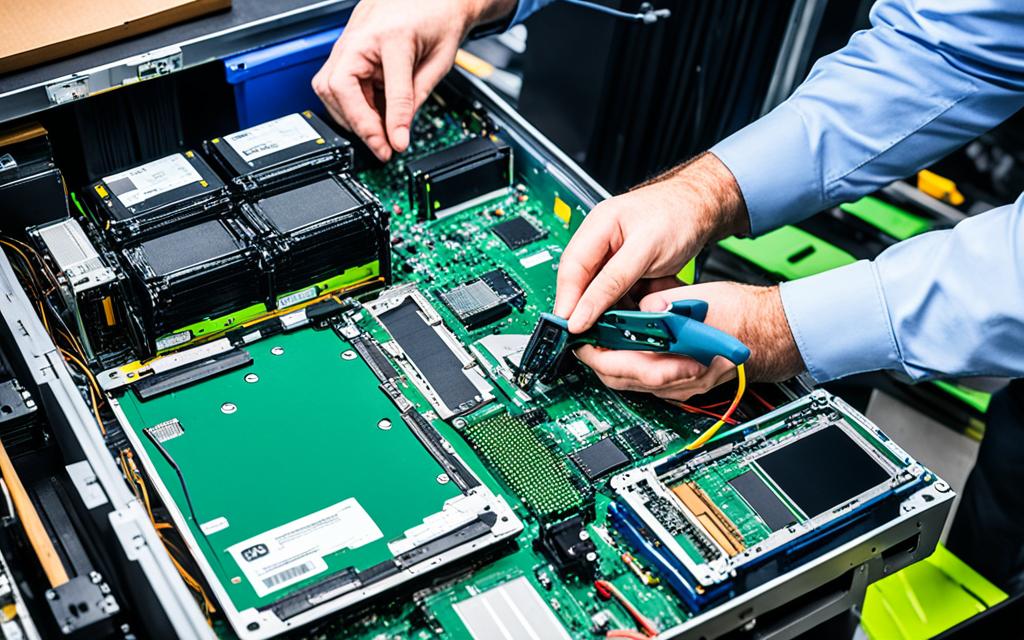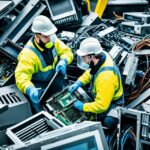Server Recycling: How to Build a Business Case for Executive Support
Are you looking to make a positive impact on the environment while also driving your business’s success? Server recycling is the solution you’ve been searching for. With the increasing demand for ethical e-waste management, it’s crucial to build a strong business case and gain executive support for your server recycling initiatives.
Server recycling not only allows you to responsibly dispose of outdated equipment but also contributes to sustainability goals and reduces your carbon footprint. By recycling servers, you can recover valuable materials, such as copper and gold, while also minimizing the negative environmental impact of electronic waste.
To convince your executives of the importance of server recycling, it’s essential to present a compelling business case. Highlight the cost savings achieved through recycling and the potential for revenue generation through the recovery of valuable materials. Emphasize the positive brand reputation and customer loyalty that can result from sustainable practices.
By building a comprehensive business plan that outlines the benefits of server recycling, you can secure the executive support needed to implement your initiatives. Showcase the potential for cost savings, environmental stewardship, and the alignment of your business with sustainability trends. Include market research that demonstrates the growing demand for ethical e-waste management and the financial advantages of recycling.
Remember, executive support is crucial for the success of any sustainability initiative. With a well-presented business case, you can gain the backing you need to make server recycling a priority within your organization.
The Growing Need for Ethical E-Waste Recycling
The improper disposal of electronic waste has become a global concern, with a staggering 53.6 million metric tonnes of e-waste generated globally in 2019. However, only 17.4% of this waste was officially documented and recycled. This alarming statistic highlights the urgent need for efficient and ethical e-waste recycling practices.
Electronic waste contains toxic additives and hazardous substances that can pose significant environmental and health hazards if not managed properly. Governments and environmental organizations are implementing stricter regulations to reduce the negative impact of e-waste on the environment.
Eco-conscious consumers are actively seeking out businesses that prioritize sustainability and responsible waste management. By adopting ethical e-waste recycling practices, businesses can meet regulatory requirements and contribute to a cleaner and healthier environment.
The Environmental Impact of Improper E-Waste Disposal
The improper disposal of electronic waste can have severe consequences for the environment and human health. Electronic devices often contain toxic substances such as lead, mercury, cadmium, and brominated flame retardants. When improperly handled or disposed of, these substances can contaminate soil, water sources, and the air, leading to pollution and ecological damage.
Additionally, the manufacturing of electronic devices requires the extraction of valuable resources and the use of energy-intensive processes. By recycling e-waste, valuable materials such as metals and plastics can be recovered and reused, reducing the need for virgin resources and minimizing the carbon footprint associated with manufacturing new devices.
The Benefits of Ethical E-Waste Recycling
Responsible e-waste recycling not only prevents environmental hazards but also contributes to a more sustainable future. By properly recycling electronic devices, businesses can:
- Reduce pollution and environmental degradation
- Conserve resources and reduce the demand for virgin materials
- Minimize energy consumption and greenhouse gas emissions
- Create job opportunities in the recycling and waste management industry
- Meet regulatory requirements and avoid legal penalties
Furthermore, businesses that prioritize ethical e-waste recycling can enhance their brand reputation and attract environmentally conscious customers.
Committing to Sustainable Waste Management
Implementing responsible waste management practices is essential for businesses looking to make a positive impact on the environment. This involves:
- Establishing convenient and accessible e-waste collection points for consumers
- Partnering with certified e-waste recycling facilities
- Educating employees and customers about the importance of e-waste recycling
- Regularly auditing and monitoring the recycling processes to ensure compliance with environmental standards
By committing to sustainable waste management, businesses can help protect the planet, conserve valuable resources, and create a more sustainable future for generations to come.
Researching the E-Waste Recycling Industry and Market Trends
Before embarking on the journey of establishing an ethical e-waste recycling business, it is imperative to delve into thorough research concerning the industry and market trends. Such research enables entrepreneurs to gain valuable insights, identify key players, understand regulatory requirements, analyze market demand, and evaluate the competitive landscape. By actively participating in industry associations and attending conferences, entrepreneurs can stay up-to-date on the latest developments and forge meaningful connections with influential stakeholders. Acquiring a deep understanding of the industry and market trends empowers businesses to make informed decisions, develop effective strategies, and create a competitive edge within the ethical e-waste recycling sector.
Key Elements of Industry and Market Research:
- Identify key players and stakeholders in the e-waste recycling industry
- Understand the regulatory requirements and compliance standards for ethical e-waste management
- Analyze the market demand and potential growth opportunities for e-waste recycling services
- Evaluate the competitive landscape to differentiate your business and develop effective strategies
- Stay updated on the latest industry trends by joining associations and attending conferences
Research is the compass that navigates entrepreneurs through the ever-evolving e-waste recycling industry and market. By uncovering invaluable insights, entrepreneurs can seize opportunities, anticipate challenges, and drive their businesses towards sustainable success.
By conducting extensive industry and market research, ethical e-waste recycling businesses can effectively align their services with market needs, ensure compliance with regulations, and identify niches or gaps in the industry that can be targeted for growth. A thorough understanding of the competitive landscape enables businesses to differentiate themselves by offering unique value propositions and innovative solutions.
Remember, knowledge is power, and comprehensive research is the cornerstone of every successful venture.
Developing a Comprehensive Business Plan
Creating a comprehensive business plan is crucial for establishing a successful and ethical e-waste recycling business. A well-developed plan provides the clarity and direction needed to guide entrepreneurs through the process of starting and growing their business.
At the core of the comprehensive business plan is a clear definition of the goals and objectives of the ethical e-waste recycling business. This includes a thorough analysis of the target market, identifying the specific needs and demands of potential customers.
Financial aspects are also essential components of the business plan. Startup costs, revenue projections, and pricing strategies should be carefully considered and outlined to ensure a sustainable and profitable operation.
Components of a comprehensive business plan may include:
- Executive Summary: A concise overview of the business, highlighting its key aspects and value proposition.
- Company Overview: A detailed description of the company, its mission, vision, and core values.
- Market Analysis: An in-depth examination of the target market, including market trends, competition, and customer profiles.
- Products and Services Description: A comprehensive outline of the offerings, highlighting unique features and benefits.
- Marketing and Sales Strategy: A strategic plan to promote the business and attract customers, including marketing channels, advertising strategies, and sales tactics.
- Operations and Management Information: An overview of the day-to-day operations, organizational structure, and key personnel.
- Financial Projections: Detailed financial forecasts, including income statements, balance sheets, and cash flow statements.
- Risk Analysis: Evaluation of potential risks and challenges, along with contingency plans to mitigate them.
- Implementation Plan: A roadmap outlining the step-by-step process of starting and scaling the business.
By developing a comprehensive business plan, entrepreneurs can gain a deeper understanding of their target market, define their business goals, and devise strategies for sustainable growth. It also acts as a valuable tool for attracting investors, securing funding, and gaining executive support.
Starting Out Strong
“A comprehensive business plan is not just a blueprint, it’s the foundation of a successful and ethical e-waste recycling business.”
Having a comprehensive business plan in place sets the stage for a strong and sustainable e-waste recycling business. It ensures that all aspects of the business, from operations to finances and marketing, are carefully planned and aligned with the goals and values of the company.
Investing time and effort into developing a solid plan not only enhances the chances of success but also demonstrates a commitment to ethical and responsible business practices. It sends a powerful message to customers, investors, and stakeholders that the business is well-prepared and dedicated to meeting their needs while making a positive impact on the environment.
A comprehensive business plan is an essential tool for navigating the complexities of the e-waste recycling industry and seizing opportunities for growth. It provides clarity, direction, and a roadmap to success, putting ethical e-waste recycling businesses in a position to make a lasting difference in the world.
Sustainable End-of-Life Management and Material Recovery
Data centers have the opportunity to enhance their sustainability efforts through sustainable end-of-life management. This approach involves the responsible disposal of aging, broken, and end-of-life assets and equipment, with a focus on diverting waste from landfills and promoting reuse and recycling. By engaging with a trusted third-party IT asset disposition operator, data centers can recover, repair, refurbish, and remarket complete units, parts, and components. This not only extends the lifespan of equipment but also helps reduce carbon emissions, conserve resources, and minimize the reliance on mining virgin materials. Recycling e-waste contributes to offsetting the environmental impact of mining raw materials and aligns with the pursuit of sustainability goals.
| Benefits of Sustainable End-of-Life Management and Material Recovery |
|---|
| – Reduction in waste sent to landfills |
| – Extended lifespan of equipment through refurbishment and remarketing |
| – Decreased carbon emissions by reusing equipment and reclaimed parts |
| – Conservation of resources by avoiding the need for mining virgin materials |
| – Contribution to sustainability goals through e-waste recycling |
By actively embracing sustainable end-of-life management and promoting material recovery, data centers can exemplify their commitment to environmental responsibility and contribute to a circular economy. This proactive approach not only mitigates the negative impact of e-waste but also unlocks value from discarded assets and equipment, aligning with the pursuit of sustainability objectives.
The Value in E-Waste and Potential Avenues to Value Creation
E-waste contains valuable metals such as copper, gold, silver, platinum, and palladium. Each year, billions of dollars’ worth of these metals are lost in discarded computer equipment and other e-waste. Telecommunications and IT players, as well as waste managers, are well positioned to capture this value by implementing circular approaches to product design and use, reclaiming components and materials, and diverting high-value e-waste to recycling. By managing e-waste responsibly and efficiently, companies can not only recover lost value but also meet customer demand for sustainable products, reduce emissions, and contribute to their net zero goals.
Telecommunications and IT players, along with waste managers, have a significant opportunity to leverage the value present in e-waste. The discarded computer equipment and other forms of e-waste contain valuable metals like copper, gold, silver, platinum, and palladium. These metals hold tremendous value, amounting to billions of dollars each year. However, much of this value remains untapped.
To unlock this value, businesses can adopt circular approaches to product design and usage. By implementing strategies that extend the life cycle of electronic devices, reclaiming components and materials, and diverting high-value e-waste to recycling, companies can recover lost value. This not only contributes to their financial success but also aligns with customer demand for sustainable products.
In addition to value recovery, managing e-waste responsibly and efficiently allows companies to reduce emissions and contribute to their net zero goals. By incorporating sustainable practices throughout the e-waste recycling process, businesses can minimize environmental impacts and create a more sustainable future.
Creating Value Through Circular Approaches
Implementing circular approaches to product design and use is key to extracting value from e-waste. By embracing strategies such as repair, refurbishment, and remanufacturing, businesses can extend the lifespan of electronic devices and maximize their value. Reclaiming components and materials from end-of-life products further enhances value recovery efforts.
In the words of Steve Jobs, “The most environmentally friendly product is the one you don’t throw away.”
By redirecting high-value e-waste to recycling facilities, businesses can ensure that valuable metals are not lost to landfill disposal. Instead, these metals can be recovered and used as feedstock for the production of new products, reducing the need for virgin materials.
Meeting Customer Demand for Sustainability
Today’s consumers are increasingly conscious of sustainability and the environmental impact of their purchasing decisions. By managing e-waste responsibly and efficiently, businesses can meet customer demand for sustainable products. This not only enhances brand reputation but also helps foster long-term customer loyalty.
Customers are more likely to support businesses that prioritize environmental responsibility and value recovery. By offering sustainable products created from recycled materials, businesses can appeal to eco-conscious consumers and gain a competitive edge in the market.
Reducing Emissions and Contributing to Net Zero Goals
One of the key benefits of responsibly managing e-waste is the reduction of emissions associated with the extraction of virgin materials. Mining for metals like copper, gold, and silver involves energy-intensive processes that release significant amounts of greenhouse gases into the atmosphere.
By recovering valuable metals from e-waste, businesses can reduce the need for mining, thereby decreasing emissions and carbon footprints. This contributes to overall sustainability goals, aligning with the global effort to achieve net zero emissions.
Conclusion
As businesses navigate the ever-evolving landscape of waste management, it has become crucial to understand the growing need for ethical e-waste recycling in the server industry. By conducting thorough research, developing a comprehensive business plan, and committing to sustainable end-of-life management, companies can establish successful and sustainable e-waste recycling practices.
One of the key advantages of embracing ethical e-waste recycling is the ability to recover the value hidden within discarded servers. By responsibly recycling e-waste, businesses can not only achieve financial benefits but also cater to the increasing customer demand for sustainable products. Furthermore, by adopting ethical practices, companies contribute to their environmental, social, and governance goals, making a positive impact on the planet.
Embracing server recycling and ethical e-waste practices is not just a moral obligation – it presents a strategic opportunity for businesses to build a sustainable future. By prioritizing sustainability and responsible waste management in the server industry, companies can actively contribute to a cleaner, healthier environment while also reaping the top-line and bottom-line benefits of recovering valuable resources. Now is the time for businesses to act and make a difference through ethical e-waste recycling, creating a brighter and more sustainable tomorrow.
FAQ
What is e-waste recycling?
E-waste recycling refers to the proper disposal and recycling of electronic waste, such as old computers, mobile phones, and other electronic devices, to prevent environmental hazards and promote responsible waste management.
Why is ethical e-waste recycling important?
Ethical e-waste recycling is important because it prevents environmental hazards and promotes responsible waste management. It also contributes to a cleaner and healthier environment by reducing the negative impact of electronic waste on the planet.
How can I start an ethical IT recycling business?
To start an ethical IT recycling business, follow these essential steps: conduct industry research, develop a comprehensive business plan, secure funding, establish partnerships, ensure regulatory compliance, acquire necessary equipment and facilities, hire qualified staff, market your services, and continuously assess and improve your operations.
What are the benefits of sustainable end-of-life management for data centers?
Sustainable end-of-life management for data centers involves responsibly disposing of aging, broken, or end-of-life assets and equipment, diverting waste from landfills, and promoting reuse and recycling. By engaging in IT asset recovery with a credible third-party IT asset disposition operator, data centers can reduce carbon emissions, conserve resources, avoid mining virgin materials, and meet sustainability goals.
How can I recover the value in e-waste?
You can recover the value in e-waste by implementing circular approaches to product design and use, reclaiming components and materials, and diverting high-value e-waste to recycling. By managing e-waste responsibly and efficiently, companies can recover lost value, meet customer demand for sustainable products, reduce emissions, and contribute to their net zero goals.
How can I build a business case for executive support in server recycling?
To build a business case for executive support in server recycling, conduct thorough research on the growing need for ethical e-waste recycling and market trends. Develop a comprehensive business plan and commit to sustainable end-of-life management. By recovering the value in e-waste, businesses can achieve top-line and bottom-line benefits, meet customer demand for sustainable products, and contribute to their environmental, social, and governance goals.















